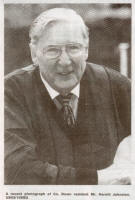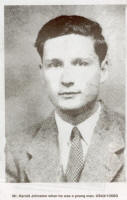
Harold Johnston Recalls His 1920's Childhood in Lisburn
County Down resident looks back at the days of his youth
 HILLHALL Road man Harold Johnston has lived most of his life on the County Down
side of the town.
HILLHALL Road man Harold Johnston has lived most of his life on the County Down
side of the town.
Now enjoying his retirement after 50 years in full-time employment, Harold has many fond memories of life in Lisburn during the 1920's and 1930's.
Born in 1927, Harold was raised in the family home at Broomhedge with his two brothers and three sisters.
He was educated at Broomhedge Elementary School but life for the average primary school pupil in the late 20's and early 30's was in sharp contrast to that of today's children.
Apart from an open fire, there was no form of heating in schools, pupils' meals were a thing of the future and children were expected to work some long hours in their family homes even at a young age.
 "The school was a mile and a half from my home and I had to walk, there was
certainly no such thing as a school bus in those days," recalled Harold.
"Many a day I remembering walking to school in the wind and the rain and if
you got wet too bad. Of course there was no heating in schools then. If you
managed to get a seat close to the fire at the front you were warm, if not, you
were cold and that was it. I heard on the news that a school in Richhill had to
close for a day because the heating wasn't working. I found that
interesting."
"The school was a mile and a half from my home and I had to walk, there was
certainly no such thing as a school bus in those days," recalled Harold.
"Many a day I remembering walking to school in the wind and the rain and if
you got wet too bad. Of course there was no heating in schools then. If you
managed to get a seat close to the fire at the front you were warm, if not, you
were cold and that was it. I heard on the news that a school in Richhill had to
close for a day because the heating wasn't working. I found that
interesting."
Harder
Harold's family life was also very different from the one children of today enjoy. Life was much harder. Just because you had finished your day's schooling did not mean you could sit down and put your feet up for the rest of the day. Televisions and computers were not in existence and Harold and his friends had to make their own fun.
"Our family all got on very well together but my parents were very strict, you had to behave," said Harold. "We had half an acre of ground to live on and many a day's hard work you had to do there. My father grew a lot of strawberries, especially in June, and we had to pick them. I did not enjoy that. It was forced labour.
"Children in those days had to make their own fun. There were no such things as leisure centres, I. remember throwing skittles at the crossroads which was always good fun.
"In the summer time everyone went down to the River Lagan to bathe. There were no baths in houses and if you wanted a bath you had to go to the river. That was good fun especially on the hot summer days. The weather was much better then, I still remember the tar melting on the roads.
School
"Your work wasn't over after you finished school. Farmers were looking for boys to work in the field and I went there when the potato gathering was in full swing."
Harold left school at 14 and after a period of labour on the farm he started working as an electrician when he was just over 15. Electricity was being introduced in many homes for the first time to replace oil lamps that had gone before.
His career as an electrician continued until 1958 when he took on a job at Thorn EMI in Belfast and became area manager for 30 years until he finally left when he was 60. He continued his employment at Atlas Communications in Newtownards where he enjoyed the `happiest' four years of his working life.
Fifty years in employment was a long time and Harold admits he has enjoyed his retirement to the full.
Wife Irene sees much more of her husband now despite his love of bowls which takes him out of the house almost seven days a week.
Harold's free time has given him time to see some of the world. He and Irene have been on five cruises and two holidays to the Mediterranean in recent years and they plan to celebrate the Millennium with a trip to South Africa.
With 2000 beckoning Harold feels that the people of today have had life a lot easier than back in the 20's and 30's, but he admits he wouldn't have changed his early years for the world.
"Although the pace of life is a lot quicker now, life is a lot easier than when I was growing up," he said. "People now are much better off than my father was.
He had it very difficult. He spent his whole week going to Mallusk first thing the morning and he always came back at the end of the day; all for 25 shillings a week."
